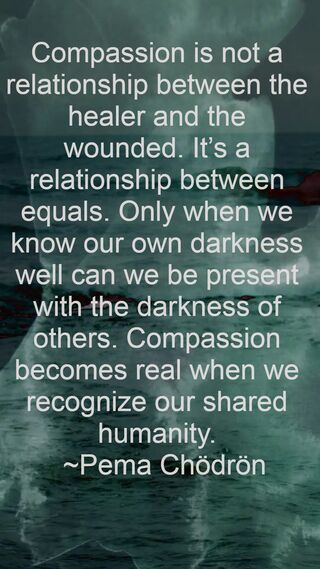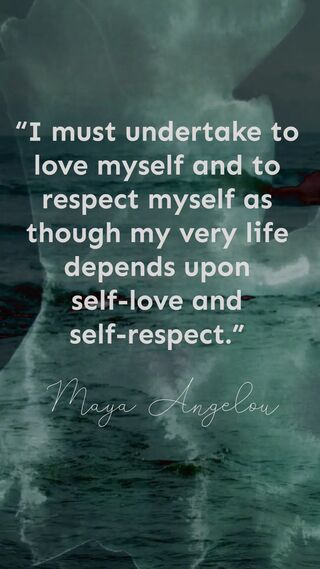Embarrassment
Journey to Your Blind Spot
Shame can be an unexpected guide through our darkest moments.
Posted May 21, 2021 Reviewed by Abigail Fagan
Key points
- When self-improvement strategies and emotional management techniques fall short, self-love can be a valuable practice.
- Shame can prevent people from seeing all parts of themselves, but it can also reveal people's blind spots.
- Self-love despite one's insecurities can be an overarching goal to work towards.
Abstinence is not the goal; self-love is1. I heard this on a recent podcast called Blind Spots, hosted by Dr. Chantelle Thomas, a health psychologist and Executive Clinical Director of a residential addiction treatment facility. Chantelle explores what we cannot see about ourselves — things that are often hidden and imprisoned by shame.
I mulled this phrase over in my mind: Abstinence is not the goal; self-love is. Whatever our addiction or ailment, there may be something more important than abstinence or even a cure. There may be something better than self-management skills for illness, trauma, pain, or fear. Whatever you struggle with — fill in the blank — a cure is not the goal; self-love is. This is foundational for how we interact with everyone and everything and a concept I am familiar with, but it struck me differently to hear it in the context of addiction and stated so simply. Actually, it startled me.
Recognizing Patterns of Self-Love
It startled me into examining my own love for myself and recognizing patterns. It went like this:
To do otherwise creates shame that we unknowingly tuck into our blind spots. Shame pushes us to protect it and creates pretense. Pretense keeps us from the authentic connection we all need. Lack of connection is hell. Without a foundation of self-love, we tend to run around in circles trying to be what we think others want us to be, shoving our shame and pain into the dark, while feeling continually frustrated and unfulfilled.
Trauma as a Catalyst
I had originally reached out to Chantelle to discuss how trauma and hardship can be catalytic agents. We eventually got around to that, but first we discussed many other things like unwashed hair, TV and movies that pack a psychological punch, and the complexity of social injustice. No matter the topic, the underpinning chorus was the same: Self-Love is the answer. Meeting ourselves in our darkest hour with gentle kindness saying “I know it hurts. You are in the pain now. It’s okay that it’s not okay.”

Self-Love or Relapse
Being able to practice self-love is not for the faint of heart. Quite the opposite, which is why we might restate it as radical self-love. And what happens if we don’t do this? For substance users, Chantelle says, “relapse is certain.” Relapse to self-rejection is relapse to use, to disconnection, and other generally injurious behavior toward oneself and others. Without self-love, we falter to the better-than/less-than comparison game; a yo-yo of diminishing or elevating self or others, judging, reducing or exalting: At least I’m better than them; yet, I am not enough, are just different sides of the same coin.
Shame Reveals Our Blind Spots
So, we need to take this seriously. Especially because the journey there can be truly terrifying. We have to travel the treacherous path of feeling our feelings. Complete this sentence: What I feel most ashamed about in my life is _______. If you answer honestly you will quickly find a part of yourself you have necessarily tucked out of sight and into your blind spot, where part of you hopes it remains forever. This is where your self-love work is waiting for you.

The Human Condition
Shining light on what we feel shame about is key. To feel the pain can release it. To release it can allow us to understand just how messy and challenging the Human Condition is. And to hold shame about our bodies — whether its unwashed hair, size, color, or sexuality; or shame about thoughts or behaviors we would prefer to eradicate, keeps them in the dark reservoir of our blind spots to then bubble up in all sorts of unsettling ways, ultimately leaving us feeling disconnected.
The Tyranny of Self-Improvement
God knows you may have tried myriad things to avoid the work of self-love; self-improvement is a common go-to, bettering yourself in 100 different ways. No doubt you’ve looked to neuroscience to explain why you feel the way you feel, to understand why you are not better than you are.
Examine your genes, brain chemistry, your diagnosis — it doesn’t matter — neither the tyranny of self-improvement nor the latest discovery in neuroscience can solve our most basic human problem: shame. Shame is nothing more than trying hard not to see or be our humanness. It’s not our emotions that make bad drivers of our brains and bodies, it's when we don’t connect with our deepest emotions like fear and sadness that makes bad drivers, mostly because they are then driving from the proverbial back seat.
Self-love is even more important than being rational or perhaps the most rational thing we can do. Without it at the base, life-management skills, techniques, and hacks are temporary at best. Our emotions are not to be managed or regulated — they are to be known and felt.

The Journey
I eventually got around to asking Chantelle if the pandemic year felt like a catalyst to her. For many it was a catalyst toward loss and separation; for others it was a catalyst toward slowing down and togetherness. Some toward inner work, real change, and growth; yet others to intensifying self-loathing, othering, and discord. Either way, it was and still may be a catalyst for you on your journey.
“But more like a medicine journey,” Chantelle said.2 She admitted to the moment she lost sight of the horizon and couldn't see her way forward. She described her I-can’t-do-this-moment with the clarity that trauma provides. “I was in it,” she said. “I didn’t know if I could do this. I didn’t know if I’d make it.” She questioned the deepest fabric of her daily work, “Do I even believe any of what I’ve been telling clients for years?”
What is it that she tells clients? “You can't see it clearly when you're in the middle of it. That is precisely when you're supposed to have faith. Trust, trust, trust with every fiber of your being.” This was the deepest parallel of her inner and outer work. She knew she was in it because she didn’t know — didn’t know what would happen, didn’t know what to do, didn’t know if she’d make it through.
“These moments remove the artificial barriers,” she said. Since we would never choose to feel this pain, it’s the force of trauma that moves us to face those things we wouldn’t and couldn’t otherwise. In this way, hard things are catalysts on our journeys. They can promote new awareness within us and reveal the wisdom that resides in our blind spots.
She returned to the known fact that people do this: “People do hard things, the worst, the impossible. And people make it through. They find meaning in heartache — now with more blinders torn off.” She had to dig into her own feelings of inadequacy and pain, seeing herself on the journey and say, “I got you,” and feel it.
References
1 Statement made by Oren Matteson on Blind Spots podcast.
2 As suggested by Craig Salerno.
This article was also inspired by Colleen Gregg and Our Journey From Here: Ever-Changed and Ever-Evolving.




